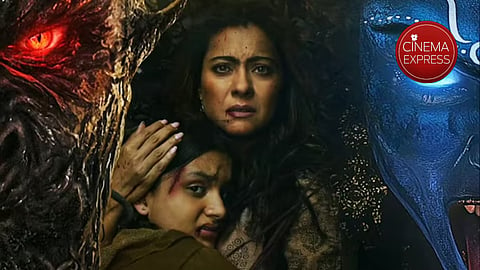Maa Movie Review: Kajol’s dramatic deity act in loosely assembled horror film
Maa(2 / 5)
Maa Movie Review: Last month marked the 50th anniversary of the release of Jai Santoshi Maa (1975), a cultural phenomenon which turned theatres into temples. I am not joking. The film was such a craze that villagers reached their nearby towns in bullock carts, took off their slippers at the entrance of the cinema hall and possibly prostrated when Anita Guha, as the titular Santoshi Maa, appeared on screen. It wasn’t a sleeper hit, the film managed to score big at the box office in a year of Sholay and Deewar. It even surpassed the latter in collections.
Directed by: Vishal Furia
Written by: Saiwyn Quadras
Cast: Kajol, Ronit Roy, Indraneil Sengupta, Kherin Sharma and Dibyendu Bhattacharya
Everytime the glowing imagery of Kaali turned up in Maa, the Kajol-headliner supernatural-horror film, I couldn’t help but think of some theatre where a viewer might be putting their popcorn aside to fold hands and seek blessings from the deity. It’s strange to feel both dread and divinity in such a quick succession. Fear gives in to reverence, a microcosm of how religion operates. There are some questionable plot developments, some VFX which screams VFX but who cares? It’s like PK turning the other cheek with Shiva’s sticker on it. Objectivity logs out when faith enters the chat.
Maa claims to be set in the world of Shaitaan (2024) which made me deduce three things: a girl will have to be saved from the horrors of patriarchy, there will be blaring BGM and we should all wait for a post-credit scene. The film revolves around Ambika (Kajol), her husband Shuvankar (Indraneil Sengupta) and their daughter Shweta (Kherin Sharma). Shuvankar hails from a rajbari-owning family of West Bengal’s Chandrapur, a place he and his wife are hush-hush about in front of their curious daughter. A death in the family makes Shuvankar pay a visit to his ancestral house but he predictably doesn’t make it back. While dealing with the grief of losing him, Ambika gets a call from Chandrapur’s sarpanch Joydev (Ronit Roy) informing her that selling the rajbari was Shuvankar’s final wish. Skeptical, Ambika and Shweta soon land in Chandrapur.
Regular horror-isms kick in once the narrative shifts to the rajbari. There is a creepy banyan tree in the woods behind. The caretaker’s family, which lives in the mansion, gives off strange vibes. We see teenage ghost girls peep at Shweta and often appear on the side of a frame to offer a lousy jump scare. Maa is directed by Vishal Furia, who has previously helmed Chhorii (2021) and Chhorii 2 (2025). He seems to be going over the same themes of patriarchy and female infanticide with this one. Infants cry in the jungle, little girls are offered as a bali, we see Kajol drown under a mob of women, an image similar to what Nushrratt Bharuccha endures in Chhorii 2, a literal representation of how patriarchy makes women pull down women.
Maa is what you get if you cross Bulbbul (2020) with a Maddock horror film. Its themes feel dated, explored so often in the Stree films. The build-up is effective, but only in parts. The lore of the film is derived from the indigenous tale of deity Kaali and her battle with the demon Raktbeej but its visual design seems borrowed. The villain looks like if the Night King from Game of Thrones decided to join the Children of the Forest. There are some impressive set-pieces though and two of them involve cars. One is when Shuvankar’s vehicle is attacked by a bunch of rogue tree vines (can’t explain) and another is when Kajol’s Ambika and her daughter Shweta are trapped inside an SUV being zombie-hoarded by over a dozen ghost girls. The film seems constantly in a bid to exhibit its special effects (VFX by Devgn Films) which, although competent, often pops out like a sore thumb in an otherwise lacklustre plot.
Maa sets it up decently but then messes up the gameboard stating that it doesn’t want to play. Its lore doesn’t hold and the plotline is predictable, derivative and often confusing at times. I sighed once the dramatic exchanges on nari shakti and a mother’s power began. Kajol was soon levitating with her hair flying in the wind. The villain utters something along the lines of “you are a mere mortal, woman.” There are only two options. You can either laugh loudly at the silliness unfolding on the screen and invite the ire of the believers in your theatre or you can sit back, relax, crunch on that popcorn, and pray. It will be over soon.

